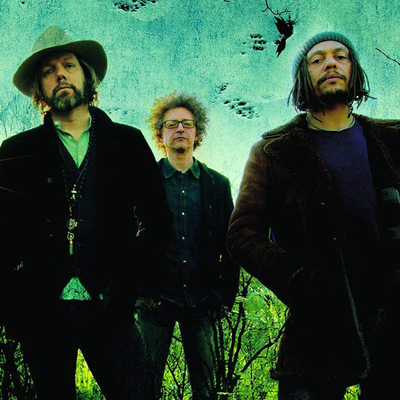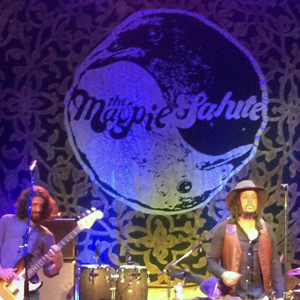Climbing hills and breaking down walls with the Magpie Salute in Paris
By NICK TAVARES
STATIC and FEEDBACK Editor

By the end of the evening, my phone's pedometer registered well over 20,000 steps and 33 flights of stairs. Such is the by product of marching up and down the staircases of the 18th arrondissement of Paris, with a day of dropping in on cafés and wine bars culminating in a trip to Élysée Montmartre, where the Magpie Salute were about to kick off their European tour.
Set within the inclines of the Montmartre region of Paris, the venue has the layout of a classic barn, with high iron girders supporting the pointed roof high above the hardwood floors that run from the stage to the bar in the back. It first opened in 1807 and was renovated twice — first in 1990 and again in 2016, both following fires. But a classic setting can only give a show an initial boost. It’s obviously on the artist to take care of the rest, and as has been the case since their first live shows a year ago, the Magpie Salute played with their typical blend of professionalism and fire.
The trio acoustic setting was again given a spotlight midshow, with singer John Hogg and guitarists Rich Robinson and Marc Ford gathering around a single microphone stand to deliver High Water I’s “Sister Moon” and the Black Crowes’ deep track “Cold Boy Smile.” The rest of the band came out then for “Nonfiction,” which began acoustic and gradually turned electric as Ford and Robinson quickly traded out guitars, resulting in a drawn-out jam that seemed to have the building slowly vibrating from the ground up.
They stretched out a few times on this night, notably on “Wiser Time” and “What Is Home,” but it’s the interplay within the base structure of the songs that seems to best reveal their musicianship. Take “Had to Cry Today,” their fiery read on the Blind Faith classic. It’s impossible to keep eyes fixed on a single musician while they’re collectively flying through this song. Does Hogg deserve the spotlight while he works his impassioned interpretation of Steve Winwood’s lyrics, or is it bassist Sven Pipien, who is flying up and down his fretboard keeping the chunky stop/start rhythm of the tune in line? Meanwhile, Robinson is handling perhaps the heaviest riff Eric Clapton ever played, while Ford is all over the map on his lead, trading searing high notes for quick slides to the end of the guitar neck and back again. In the hands of a lesser group, the song would fall apart, and these guys never seem to even entertain that thought.
But as has become the case, it’s the band’s own songs within its expanding repertoire that carried the night. Opening straight away with the patiently driving “High Water” accented every strength of the band — Robinson’s riffs, Ford’s leads, Hogg’s ability to track from low to high and quiet to fervent as needed within the song. There’s space within structure and it all comes just a little bit more alive with each play on each night. Kicking off the proceedings with that song and following up immediately with the driving riffs of “Mary the Gypsy” only further displays that broadening palate. It also rocks. It helps that all of this rocks.
And it’s a reminder that this works anywhere. While certainly well within the bounds of western culture, France is certainly a different setting than the United States or the United Kingdom. There are different rules of etiquette and just a different rhythm at which people live. But when music works, it works in a lot of places, and it lived well within these ancient walls. They stepped up to the challenge because they had to, and because they always do.

Email Nick Tavares at nick@staticandfeedback.com




